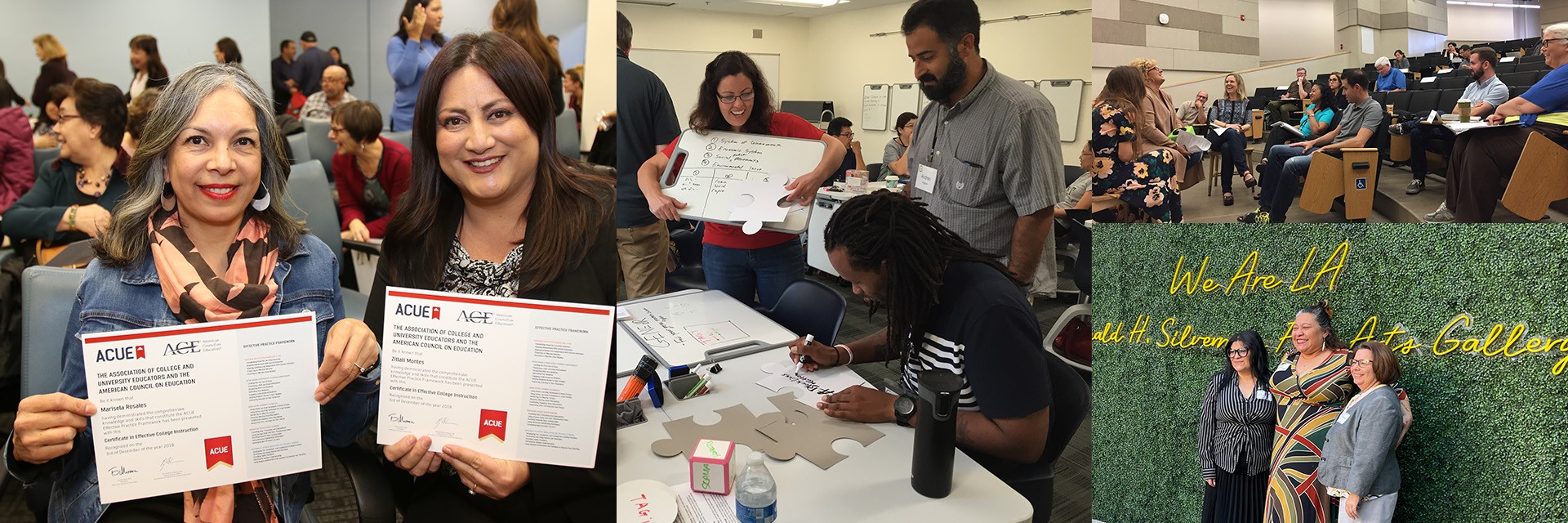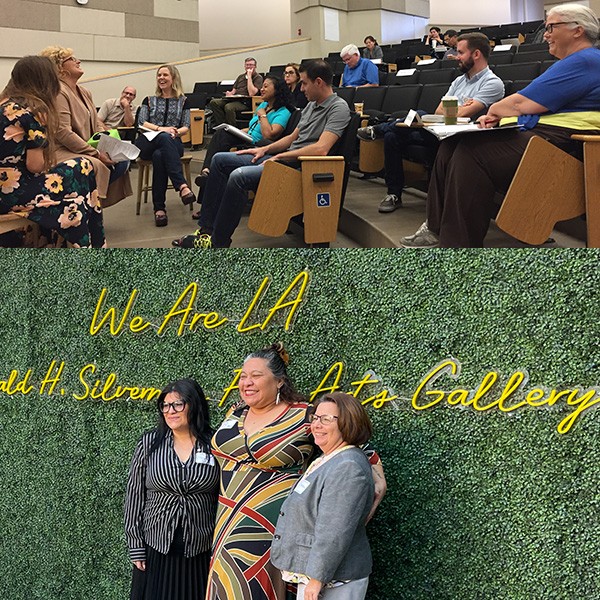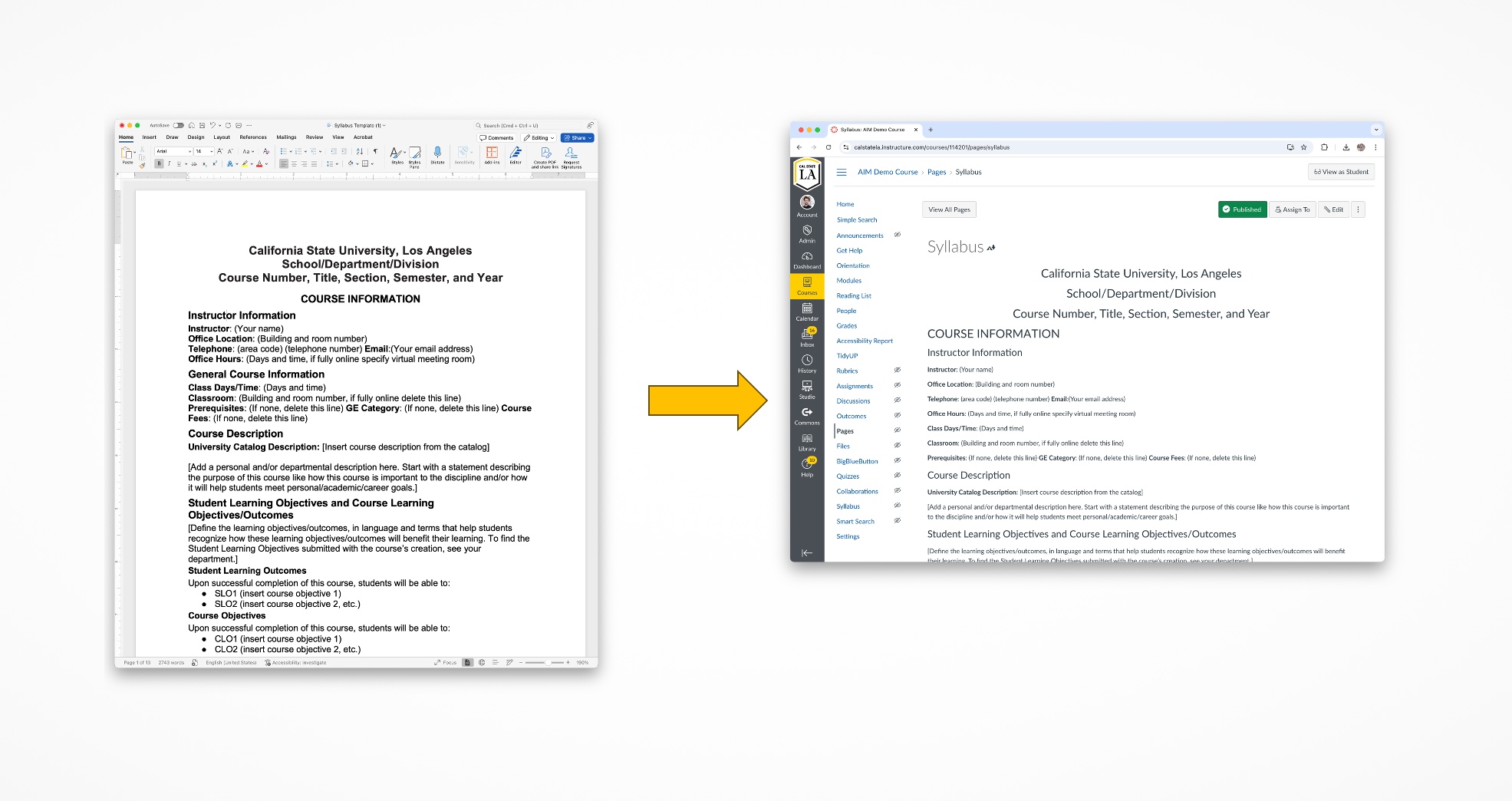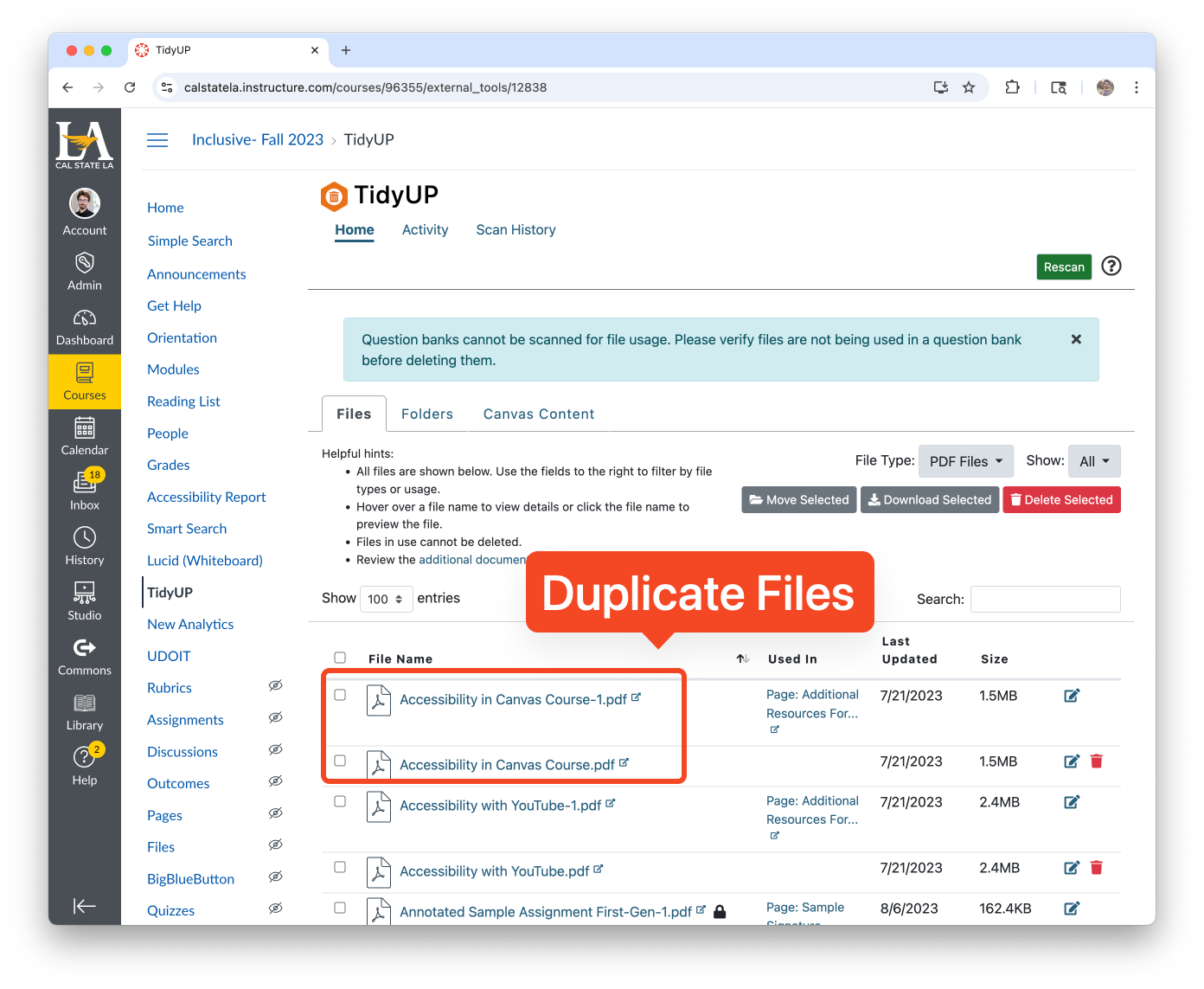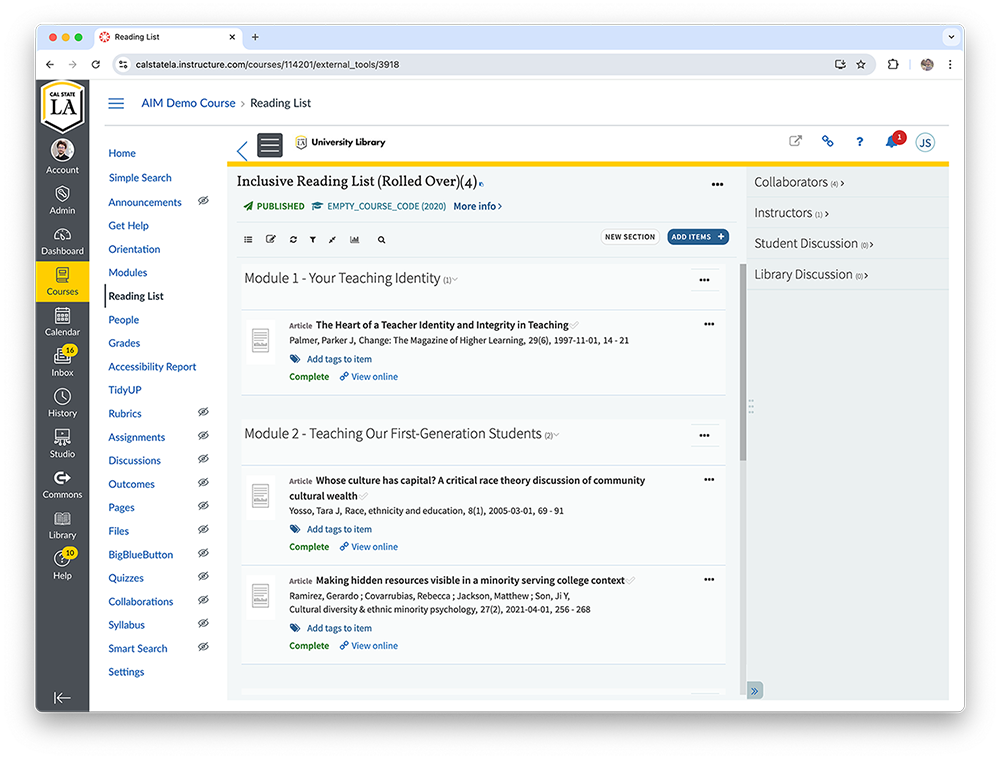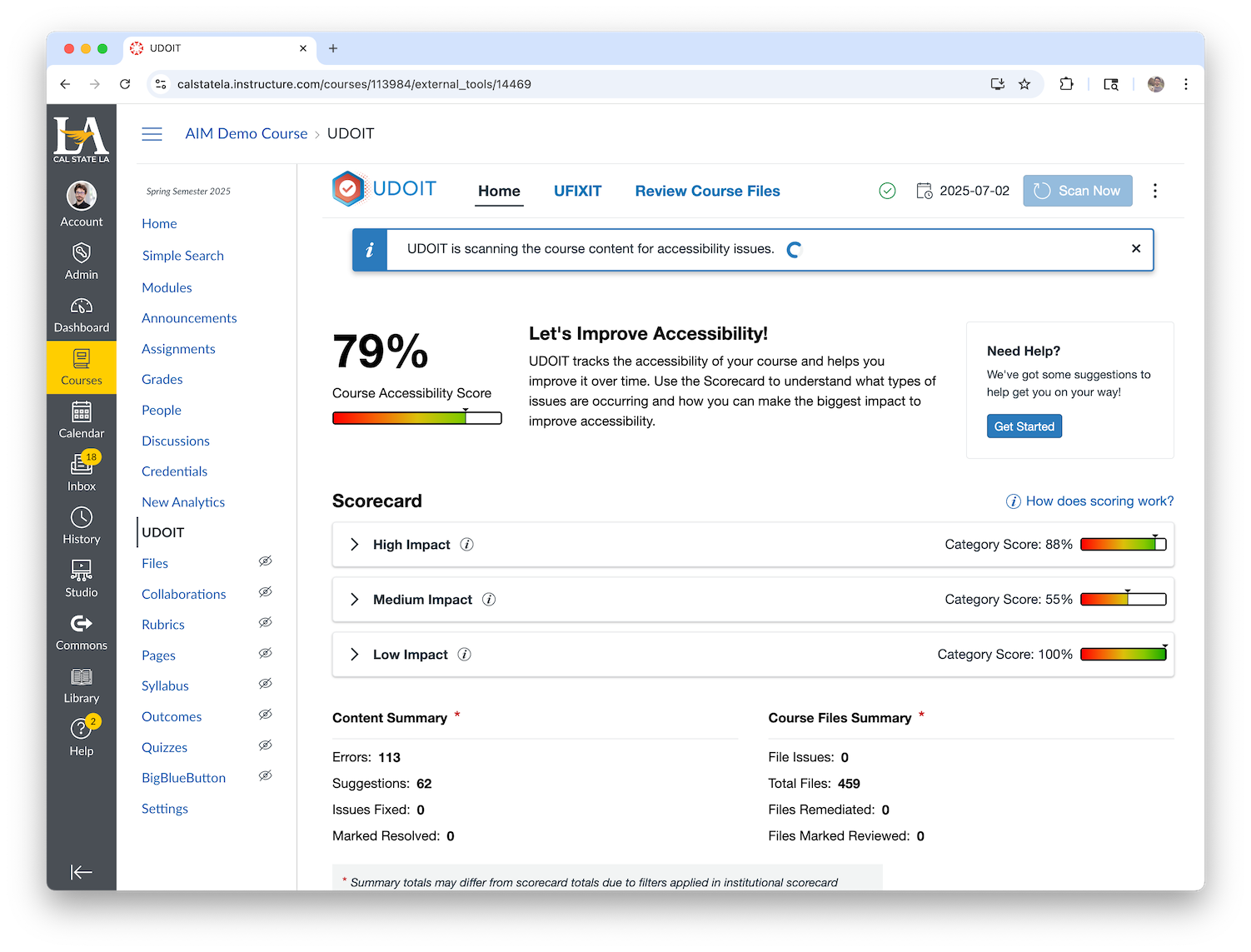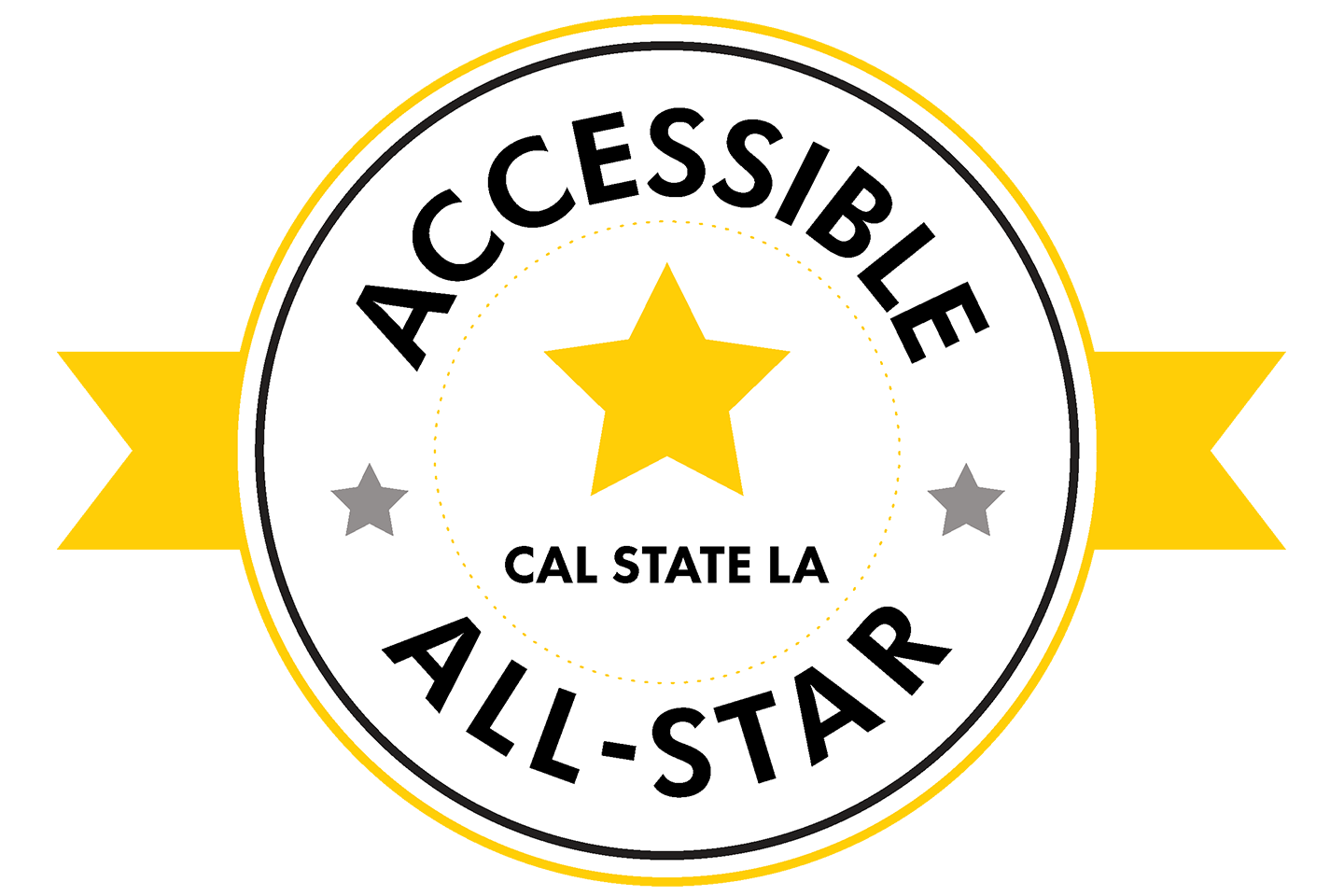Accessible instructional materials are key to enacting the University’s mission of promoting a culture of equity, diversity, inclusion, and belonging. By ensuring instructional materials are accessible, faculty help promote EDIB within their teaching, and create an equitable learning environment that benefits all students.
10 Steps to a More Accessible Course
You do it, we do it, let's do it together. Accessibility is a community effort.
You can take these five steps to improve the accessibility of your course materials.
WHAT: Create your course syllabus directly in Canvas. Use either a Page or the Canvas Syllabus.
WHY: Canvas page content is often more accessible than a PDF copy of your syllabus. It also saves time, as revisions can be made directly in Canvas. No need to create a PDF and uploaded the revised file.
HOW:
WHAT: Use TidyUP in Canvas to quickly identify and clean up unused content in your course. This includes duplicate files.
Scan your course, download copies of all content for safekeeping, then delete unused content all from within TidyUP.
WHY: A decluttered course is easier to make accessible. Whether asking for help or doing it yourself, focus on improving content currently in use.
HOW:
WHAT: Upload video or create new recordings with Panopto (video tool inside Canvas). Panopto offers closed captioning tools to ensure media is accessible.
WHY: All video uploaded or created in Panopto receives machine-generated captions. With minor edits, these captions can be made more accurate.
HOW:
Have a long video or need to caption a Youtube clip? Visit the ITS Accessibility webpage to learn more about accessible audio and video. You can submit a closed captioning request (bottom of page) to have human-generated captions created for you.
WHAT: As you create content directly in Canvas using the Rich Content Editor (RCE), ensure it's accessible. This includes text or images added to Assignments, Discussions, Quizzes, and Pages.
WHY: The RCE features simple and straightforward tools to create accessible text and images. The RCE prompts you to add alt-text, suggests accessible colors for text, and features an accessibility Checker to determine if page content is accessible.
HOW:
WHAT: As you create or update content in Microsoft Office, ensure it's accessible. This includes popular content types such as Word Documents and PowerPoint Presentations.
WHY: Microsoft Office content is widely used. While less easy to use than the Canvas Rich Content Editor, Office provides tools and methods to ensure content is accessible.
HOW:
Read: Make Your Word Documents Accessible (Microsoft)
Watch: Create More Accessible Word Documents (Microsoft)
Read: Make Your PowerPoint Presentations Accessible (Microsoft)
Watch: Create More Accessible PowerPoint Presentations (Microsoft)
Visit the ITS Accessibility webpage for an in depth guide to making your Office documents more accessible.
We can take these four steps together.
WHAT: Provide multiple avenues for students to access required readings, including downloading a PDF or viewing the full text in their web browser.
Reading Lists allow instructors to search and add content from library OneSearch, databases, the internet, and upload instructor-owned files. Instructors can track student engagement with course materials stored in Reading List.
WHY: A full text online option is often more accessible than a PDF file.
HOW:
WHAT: Submit digital files or video clips to ITS for remediation. ITS staff can fix PDF files where a source file (Word Doc) is not available. Video is sent out to professional captioning service.
WHY: Complex digital accessibility tasks are best left to professional staff. This saves you time, but also ensures materials are made accessible correctly and efficiently.
HOW:
WHAT: UDOIT helps identify inaccessible text, images, and files. UDOIT is an accessibility awareness tool integrated into Canvas. UDOIT stands for Universal Design Online Content Inspection Tool.
WHY: Quickly see the course accessibility score and a complete report of all accessibility issues in the course. Fix issues directly via the report or determine whether to request assistance from ITS.
HOW:
WHAT: CETL offers two webinars several times a semester for all faculty and staff:
- Accessible Instructional Materials (AIM) webinar.
- 8 Steps to a More Accessible Course webinar.
WHY: Join CETL's instructional design and academic technology teams to discuss, learn, and apply specific strategies and techniques. Get your questions answered and brainstorm with colleagues about all things accessibility.
HOW: Please check our latest workshops and register.
WHAT: The Office for Students with Disabilities provides reasonable academic accommodations based on disability for eligible students under the Americans with Disabilities Act (ADAA) of 1990. Each semester, OSD coordinates accommodations, arranges for student support in the classroom, and address both student and faculty concerns regarding the accommodations process.
WHY: The Office for Students with Disabilities is committed to creating an inclusive, accessible, and equitable educational environment for all students. In partnership with faculty, OSD aims to empower students with disabilities by providing individualized support services, reasonable accommodations, and advocacy to ensure equal access to academic opportunities across campus. Through collaboration, and education, we strive to promote inclusion and independence.
HOW: Visit the OSD webpage to review proactive recommendations for instructors and get in contact with questions or concerns.
Accessible All-Stars
Faculty & Staff Showcase
Over 260 [faculty, staff, and administrators] have worked with ITS Universal Design Services, the University Library, and CETL to ensure their instructional materials are accessible.
- Pau Abustan, Women's, Gender, and Sexuality Studies
- Hsin-Fu Chiu, Modern Languages & Literatures
- Harry Conley, Arts and Letters
- Elizabeth Corzo-Duchardt, TV, Film, and Media Studies
- Dalila Droege, TV, Film, and Media Studies
- Dustin Garnet, Art
- Irene Grau, Communication Studies
- Rasha Hannouche, Communication Studies
- Fredrick Hess, English
- Katherine Howard, Philosophy
- Chelsea Johnson, English
- Patricia Kilroy, Music
- Kate Kurtin, Communication Studies
- Nidhin Maheshbhai Patel, TV, Film, and Media Studies
- Julie Matos, Communication Studies
- Aya Nakagoshi, Liberal Studies
- Rory Olivarez, English
- Judy Ann Olson, English
- Diamond Or, Communication Studies
- Rachel Pearl, TV, Film, and Media Studies
- Lizette Rivera, Liberal Studies
- Lori Rusch, Art
- Melissa Saywell, Women's Gender and Sexuality Studies
- Lorna Turner, Art
- Alicia Tycer, Theatre Arts
- Jeannette Vaught, Liberal Studies
- Elaine Wittenberg, Communication Studies
- Cezhan Ambrose, Finance, Law & Real Estate
- Jeffrey Anderson, Marketing
- Andre Avramchuk, Business
- Shilpa Balan, Computer Information Systems
- LiHsueh Chen, Economics & Statistics
- Anwesha Choudhury, Management
- Seongwon Choi, Management
- Charles Danso, Finance, Law & Real Estate
- Edan Epstein, Business
- Sandor Ferencz, Economics & Statistics
- David Gadish, Computer Information Systems
- Nanda Ganesan, Computer Information Systems
- Ronald Steven Glickman, Management
- Mohammad Hashemi Joo, Finance, Law & Real Estate
- Haihong He, Accounting
- Rui (Shelly) Hu, Accounting
- Mine Ucok Hughes, Marketing
- Barrington Hunt, Management
- Susan Khoee, Computer Information Systems
- Gokhan Kumpas, Economics & Statistics
- Tinwah Lau, Accounting
- Daniel Lee, Finance, Law & Real Estate
- Dong-Woo Lee, Accounting
- Bo Li, Management
- Natalie Liberman, Management
- Asia Lockett, Marketing
- Marco Martinez Del Angel, Economics & Statistics
- Ovanes Hovik Mikaelian, Computer Information Systems
- Arjun Mitra, Management
- Neda Mossaei, Marketing
- Haejung (Audrie) Na, Finance, Law & Real Estate
- Carlin Nguyen, Marketing
- Daniel Razmjou, Computer Information Systems
- James Refalo, Finance, Law & Real Estate
- Sunil Sapra, Economics & Statistics
- Brandon Shamim, Management
- Parkev Tatevosian, Finance, Law & Real Estate
- Maryam Tofighi, Marketing
- Juanita Trusty, Management
- Shikha Upadhyaya, Marketing
- BingBing Wang, Finance, Law & Real Estate
- Ming Wang, Computer Information Systems
- Jan Weissman, Computer Information Systems
- Fu-Jung (Anne) Wu, Management
- Song Xing, Computer Information Systems
- Jong Yi, Finance, Law & Real Estate
- Angela Young, Management
- Eric Young, Economics & Statistics
- Lijuan Zhao, Accounting
- Joanna Zhao, Accounting
- Toby Baker, Education Curriculum & Instruction
- David Calvo, Educational Foundations
- Nicholas Casias, Special Education & Counseling
- Ya-Chih Chang, Special Education & Counseling
- Gina Chavez, Special Education & Counseling
- Margaret Clark, Special Education & Counseling
- Dolores Delgado Bernal, Educational Foundation
- Diane Fazzi, Special Education & Counseling
- Joan Fingon, Education Curriculum & Instruction
- Ariana Garcia, Special Education & Counseling
- Veronica Gonzalez, Education Curriculum & Instruction
- Anne Haga, Special Education & Counseling
- Erica Hamilton, Education Curriculum & Instruction
- Judy (Yunzhen) Huang, Special Education & Counseling
- Kelly Maloney, Education Curriculum & Instruction
- Sarah Manchanda, Special Education & Counseling
- Jamie Marsh, Education Curriculum & Instruction
- Ramona McLaughlin, Special Education & Counseling
- Bahiyyih Meyrath, Teaching English to Speakers of Other Languages (TESOL)
- Deborah Mi Oh, Applied & Advanced Studies in Education
- Gina Michell, Special Education & Counseling
- Frank Olmos, Applied & Advanced Studies in Education
- Socorro Orozco, Education Curriculum & Instruction
- Kimberly Perry, Applied & Advanced Studies in Education
- Manuel Ponce, Educational Foundation
- Ambika Raj, Education Curriculum & Instruction
- Jennifer Symon, Special Education & Counseling
- Natalie Williams Awodeha, Special Education & Counseling
- Miguel Zavala, Education Curriculum & Instruction
- Lili Zhou, Education Curriculum & Instruction
- Syed Ahmed, Civil Engineering
- Navid Amini, Computer Science
- XiaoLei Chen, Fire Protection Administration & Technology
- Kamyar Khashayar, Mechanical Engineering
- David Krum, Computer Science
- Maryam Nazari, Civil Engineering
- Khosrow Rad, Electrical & Computer Engineering
- Jessica Santos, Engineering
- Michael Thomas, Technology
- Xiang Wei, Civil Engineering
- Yuqing Zhu, Computer Science
- Maria Ambriz, Chicana(o) Latina(o) Studies
- Lani Cupchoy, Chicana(o) Latina(o) Studies
- Joanna Flores, Chicana(o) Latina(o) Studies
- Rosalba Gonzalez, Chicana(o) Latina(o) Studies
- Michelle Lopez, Chicana(o) Latina(o) Studies
- Elizabeth Alvarez, Criminal Justice & Criminalistics
- Tanja Baum Low, Nursing
- Trishmonisha Blagdon, Communication Disorders
- Dwan Bridges, Kinesiology
- Brittany Brooks, Nursing
- Maja Broz, Nutrition and Food Science
- Carolyn Buenaflor, Public Health
- Siouxsie Calderon, Social Work
- Todd Chamberlain, Criminal Justice
- Andrew Cornwell, Kinesiology
- Rakel Delevi, Child & Family Studies
- Suzanne Elizondo, Nutrition and Food Science
- Maria Eugenia Castro, Communication Disorders
- Gabriel Ferreyra-Orozco, Criminal Justice
- Kelly Field, Child Development
- Deborah Fingerhut, Child and Family Studies
- Colleen Friend, Social Work
- Allison Fuligni, Child & Family Studies
- Sandra Garcia, Child & Family Studies
- Joanna Gaspar, Public Health
- Stephen Gonzalez, Kinesiology
- Kimberly Gottesman, Nutrition and Food Science
- Susan Havens, Kinesiology
- Kathryn Amanda Hillstrom, Nutrition and Food Science
- Beth Hoffman, Public Health
- Peter Ivory, Communication Disorders
- Talato Kabore, Nursing
- Joanna Karczewska, Social Work
- Anureet Kaur, Kinesiology
- Claudia Kouyoumdjian, Child & Family Studies
- Susan Lee, Communications Disorders
- Shichun Ling, Criminal Justice & Criminalistics
- YaFen Lo, Child & Family Studies
- Ann Lurati, Nursing
- Sunil Mangalassary, Food Science and Technology
- Robin Marbelle, Child & Family Studies
- Ghaith Bani Melhem, Nursing
- Minas Michikyan, Child & Family Studies
- Jessica Morales-Chicas, Child & Family Studies
- Michele Nicolo, Nutrition and Food Science
- Carlena Orosco, Criminal Justice & Criminalistics
- Mae Pang, Kinesiology
- Leila Rahnama, Kinesiology
- Jorge Ramirez, Child & Family Studies
- Erica Ellis Ray, Communication Disorders
- Lorna Reid, Health & Human Services
- Joshua Ruffin, Criminal Justice & Criminalistics
- Bill Sanders, Criminal Justice & Criminalistics
- Elaine Schneider, Kinesiology
- Cheryl Simmons, Kinesiology
- James Simon, Social Work
- Gregory Stevens, Public Health
- Azita Tabatabei, Food Science & Technology
- Casey Thomas, Nutrition and Food Science
- Daisy Torres, Child & Family Studies
- Keirstin Uomoto, Nursing
- Leonor Vazquez, Child & Family Studies
- Leslie Vasquez, Child & Family Studies
- Apryl Vines, Kinesiology
- Kimi Waite, Child & Family Studies
- Tracy Webb, Criminal Justice
- Su Jeong Wee, Child & Family Studies
- Richard Whitaker, Communication Disorders
- Natalie Williams Awodeha, Child & Family Studies
- Jan Wong, Communication Disorders
- Wook Yang, Child & Family Studies
- Aaron Zaima, Social Work
- Jared Abbott, Political Science
- Shamim Ahmed, Physics & Astronomy
- Amira Ainis, Anthropology
- Lauren Arenson, Sociology
- Okezie Aruoma, Chemistry & Biochemistry
- Ousmane Ba, Mathematics
- Beth Felice Baker-Cristales, Anthropology
- Vagik Babakhanian, Psychology
- Michael Baum, Psychology
- Jessica Bodoh-Creed, Anthropology
- James Brady, Anthropology
- Jessica Bremner, Geography, Geology, and Environment
- Jennifer Curren, History
- Serj Danielian, Biological Sciences
- Dawn Dennis, History
- Katie Dingeman, Sociology
- Christopher Endy, History
- Gaithri Fernando, Psychology
- Eileen Ford, History
- Yolanda Galvan, Dean's Assistant
- Xian Gao, Political Sciences
- Richard Groper, Political Science
- Hektor Gusha, Psychology
- Angelique Hamane, Geography, Geology, and Environment
- Analena Hassberg, Sociology
- Michael Hayes, Chemistry & Biochemistry
- Kristen Hourigan, Sociology
- Maha Karout, Anthropology
- Soo Mee Kim, Sociology
- Sharona Krinsky, Mathematics
- Libby Lewis, Sociology
- Jingjing Li, Geography, Geology, and Environment
- Lisa Lugo, Biological Sciences
- Sui Wing Man, Mathematics
- Brigitte Matthies, Psychology
- Herwick Mok, Physics & Astronomy
- Felicia Montes, Latin American Studies
- Susana Morales, Latin American Studies, Anthropology
- Wei Jun Pan, Physics & Astronomy
- Joyce Parga, Anthropology
- Hyunsook Park, Biological Sciences
- Shakila Rahman, Biological Sciences
- Heidi Riggio, Psychology
- Richard Peter Ramirez, Political Science
- Brenda Rounds, Chemistry & Biochemistry
- Emilie Royer, Physics and Astronomy
- Christiana Saldana, Geography, Geology, and Environment
- Tina Salmassi, Biological Sciences
- Tanya Sanabria, Sociology
- Tatev Sarkissyan, Psychology
- James Christian Sera, Anthropology
- Joe Shutz, History
- Harry Themann, Physics and Astronomy
- Quichen Tu, Psychology
- Linda Tunstad, Chemistry & Biochemistry
- Mircea Voda, Chemistry & Biochemistry
- Yixian Wang, Chemistry & Biochemistry
- Robert Weide, Sociology
- Mark Wild, History
- Sasha Wright, Biology
- Karen Wu, Psychology
- Mohamed Maged Youssef, Biology
- Dong Zhang, Chemistry & Biochemistry
- Meredith Zhang, Sociology
- Dong Zhou, Mathematics
- Leila Abouzaki, Professional and Global Education
- Margaret Hawkins, Professional and Global Education
- Theora Brown, Academic Faculty Affairs
- Loan Dao, Academic Faculty Affairs
- Alexis Diaz, Office for Students with Disabilities
- Janet Fang, Career Center
- Gabriela Zamora, Office for Students with Disabilities
- Bridgid Fennell, Library & Information Science
- Tiffanie Ford-Baxter, Library
- Anna Ramirez, Library
- Ariana Varela, Library
- Jeannette Vaught, Library & Information Science
FAQs
Faculty Affairs, CETL, the University Library, the Office for Students with Disabilities, and ITS Universal Design Services have partnered to offer you easy-to-use, no-cost resources to make your digital instructional materials accessible. This initiative provides how-to resources that teach you to proactively create accessible instructional materials, enabling you to create accessible materials for your classes, as well as remediation support for your existing Canvas course content.
Accessible instructional materials are key to enacting the University’s mission of promoting a culture of equity, diversity, inclusion, and belonging. By ensuring your materials are accessible, you help promote EDIB within your teaching, and create an equitable learning environment that benefits all students.
As you teach your course, you may use PowerPoints, Word documents, PDFs, and instructional videos. These materials can be made more accessible by providing all students multiple means of representing the content, such as images with text-based descriptions (alt-text), videos with accurate closed captioning, and readable PDFs.
When you make your digital files accessible, you show your commitment to promoting equity, diversity, inclusion, and belonging in their teaching to benefit all students. This makes you an Accessible All-Star!
Faculty who utilize the remediation services and attend informational workshops will be recognized on our website Showcase page, will receive a digital badge, and will be encouraged to include their achievement in their RTP dossier. We encourage you to visit this website, learn more about the initiative, and see your colleagues who have become Accessible All-Stars.
When you have remediated your course, share this success with your students! We encourage you to promote the work you have done to make your course equitable and accessible. Some points you may want to share with your students include:
All PPTs, Word Documents, and PDFs will be readable by screen readers.
All images have Alt-text that describes the images for students using a screen reader.
